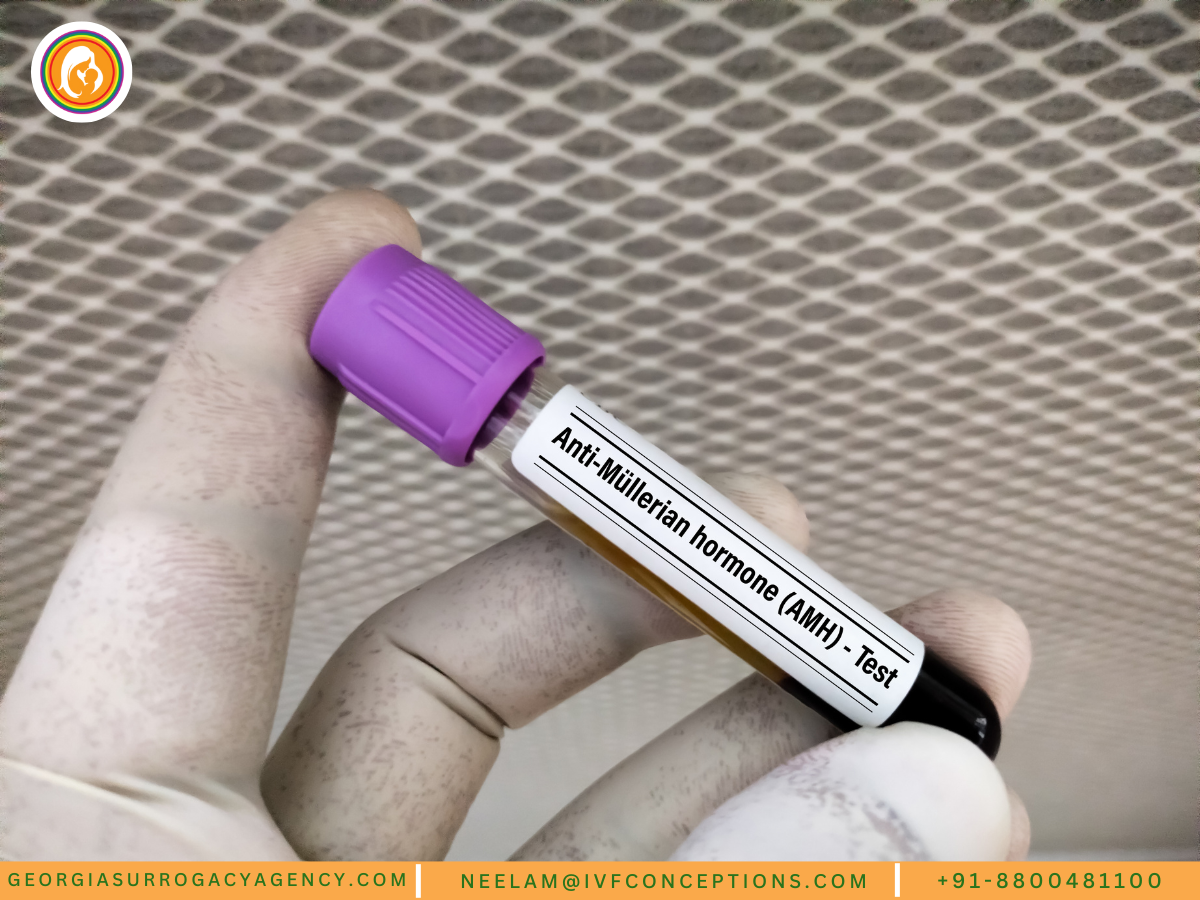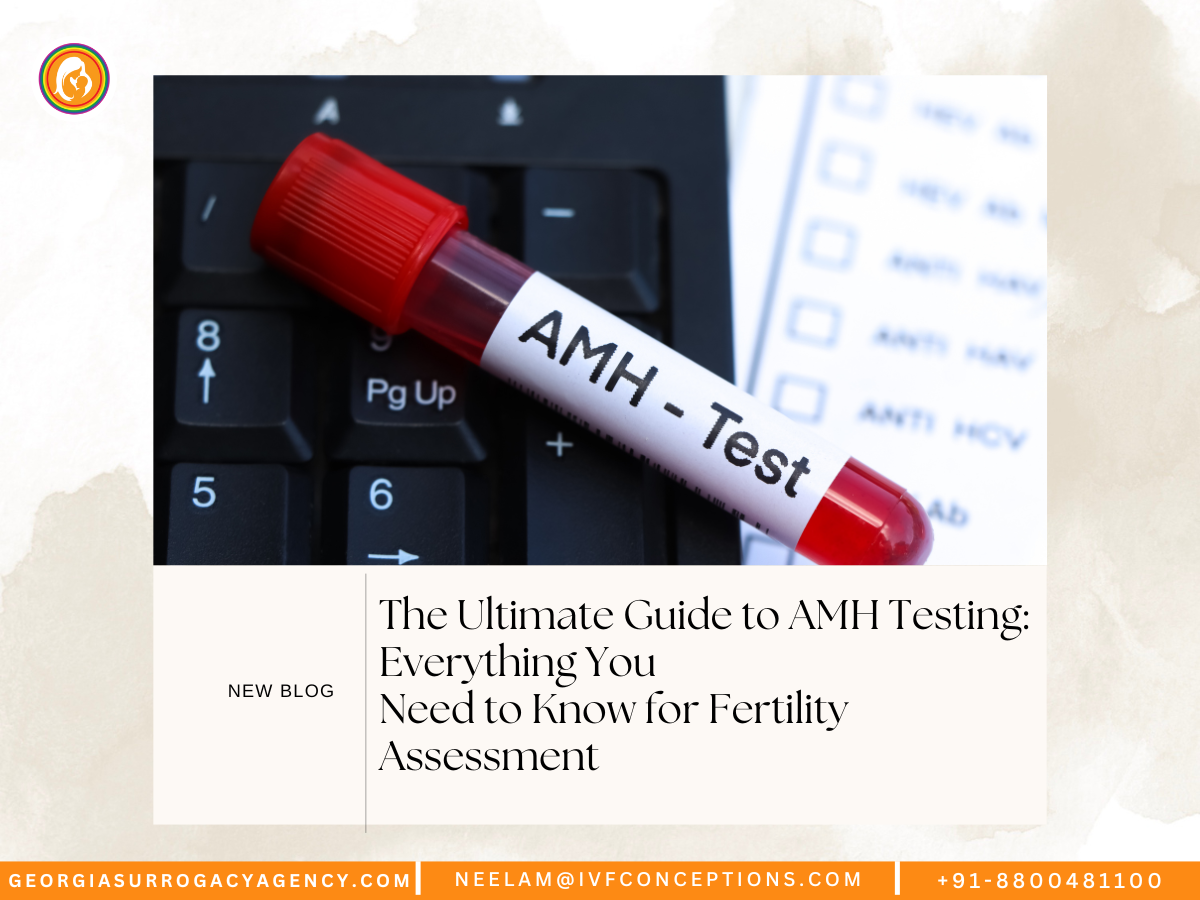The Ultimate Guide to AMH Testing
Introduction: In the world of fertility treatments, you’ve likely encountered numerous acronyms like IUI, FSH, and IVF. However, there’s another crucial term you should familiarize yourself with: AMH, or Anti-Müllerian Hormone. This comprehensive guide will delve into the intricacies of AMH testing, its significance in fertility assessment, and how it can impact your journey to parenthood.
- Book an online appointment: Get a free online consultation.
- Call\W:+91-8800481100 Email:neelam@ivfconceptions.com
What is AMH?
Anti-Müllerian Hormone (AMH) is a protein hormone produced by the granulosa cells in the ovarian follicles. It has gained prominence as a key indicator of ovarian reserve, providing valuable insights into a woman’s reproductive potential. AMH plays different roles depending on age and sex:
- In fetal development:
- AMH is crucial in determining the development of sex organs in unborn babies.
- High levels of AMH, along with other male hormones, prevent female organ formation and promote male organ development in XY (male) fetuses.
- Insufficient AMH can lead to the formation of both male and female sex organs, resulting in ambiguous genitalia or intersex conditions.
- In adult females:
- AMH levels reflect the number of remaining egg follicles in the ovaries.
- It serves as a marker for ovarian reserve and potential fertility.
- AMH testing can help diagnose menstrual disorders and monitor certain types of ovarian cancer.
Additional Guides for Surrogacy in Georgia
How to find surrogate mother in Argentina
How to find surrogate mother in Georgia
The Importance of AMH in Fertility Assessment:
AMH has become increasingly valuable in reproductive medicine for several reasons:
- Ovarian Reserve Indicator: AMH levels provide a reliable estimate of a woman’s egg supply, helping predict her reproductive potential.
- Age-Independent Marker: Unlike other hormones, AMH levels remain relatively stable throughout the menstrual cycle, making it a convenient test that can be performed at any time.
- Predictive Value: AMH levels can help forecast a woman’s reproductive lifespan and the onset of menopause.
- Treatment Planning: Fertility specialists use AMH results to tailor treatment protocols and determine the most appropriate interventions for each patient.
- PCOS Diagnosis: Elevated AMH levels can aid in diagnosing Polycystic Ovary Syndrome (PCOS), a common cause of infertility.
The AMH Test Procedure:

The AMH test is a simple blood test that can be performed at any time during the menstrual cycle. Here’s what to expect:
- A healthcare professional will draw a small blood sample from a vein in your arm.
- The procedure typically takes less than 5 minutes and causes minimal discomfort.
- The blood sample is sent to a laboratory for analysis.
- Results are usually available within a few days to a week.
Interpreting AMH Test Results: AMH levels are typically measured in nanograms per milliliter (ng/mL) or picomoles per liter (pmol/L). The following table provides a general reference range for AMH levels in adult females:
| AMH Level (ng/mL) | AMH Level (pmol/L) | Interpretation |
| < 0.3 | < 2.2 | Very low (limited ovarian reserve) |
| 0.3 – 0.7 | 2.2 – 5.0 | Low |
| 0.7 – 3.5 | 5.0 – 25.0 | Normal |
| > 3.5 | > 25.0 | High (possible PCOS) |
It’s important to note that these ranges can vary slightly between laboratories and should be interpreted in conjunction with other factors such as age, overall health, and additional fertility markers.
Age-Specific AMH Levels:
AMH levels naturally decline with age. Here’s a general guide to expected AMH levels by age group:
- Under 30 years: 3.0 – 6.8 ng/mL
- 30-35 years: 2.0 – 4.0 ng/mL
- 35-40 years: 1.0 – 3.0 ng/mL
- 40-45 years: 0.3 – 2.0 ng/mL
- Over 45 years: 0.1 – 1.0 ng/mL
Remember that these are general ranges, and individual results may vary. Your fertility specialist will interpret your AMH levels in the context of your overall health and reproductive goals.
Factors Affecting AMH Levels:
Several factors can influence AMH levels, including:
- Age: The most significant factor, as AMH levels naturally decline over time.
- Genetics: Some women may have naturally higher or lower AMH levels.
- Ethnicity: Studies have shown variations in AMH levels among different ethnic groups.
- Body Mass Index (BMI): Extreme BMIs (very low or very high) may affect AMH production.
- Smoking: Tobacco use can accelerate the decline of ovarian reserve and lower AMH levels.
- Vitamin D deficiency: Low vitamin D levels have been associated with lower AMH levels.
- Certain medical conditions: PCOS, endometriosis, and autoimmune disorders can impact AMH levels.
- Previous ovarian surgery: Procedures that affect ovarian tissue can influence AMH production.
When to Consider AMH Testing:
AMH testing may be recommended in the following situations:
- Fertility assessment: For women planning to conceive or experiencing difficulty getting pregnant.
- Family planning: To gauge reproductive potential and make informed decisions about timing pregnancy.
- Evaluating menstrual irregularities: To investigate amenorrhea or other menstrual disorders.
- PCOS diagnosis: As part of the diagnostic process for polycystic ovary syndrome.
- Predicting menopause onset: To estimate the timing of menopause, especially for women considering fertility preservation.
- Monitoring ovarian cancer: In some cases, to track treatment progress in certain types of ovarian cancer.
- Assessing fertility preservation options: For women considering egg freezing or facing medical treatments that may affect fertility.
AMH Testing in Fertility Treatments:
AMH testing plays a crucial role in various fertility treatments:

- In Vitro Fertilization (IVF):
- Helps determine the optimal stimulation protocol
- Predicts ovarian response to gonadotropin stimulation
- Assists in estimating the number of eggs that may be retrieved
- Intrauterine Insemination (IUI):
- Guides the decision between IUI and more advanced treatments like IVF
- Helps set realistic expectations for treatment outcomes
- Egg Freezing:
- Informs decisions about the timing of egg retrieval and storage
- Estimates the number of cycles needed to achieve desired egg yield
- Fertility Preservation:
- Assists in counseling patients about future fertility potential
- Guides decisions about fertility preservation methods for cancer patients or those delaying childbearing
Can AMH Levels Be Improved?
While AMH levels are largely determined by genetics and age, some strategies may help optimize ovarian health and potentially influence AMH levels:
- Maintain a healthy lifestyle:
- Balanced diet rich in antioxidants and omega-3 fatty acids
- Regular exercise
- Stress management techniques like yoga or meditation
- Quit smoking: Smoking cessation can help slow the decline of ovarian reserve.
- Vitamin D supplementation: Addressing vitamin D deficiency may positively impact AMH levels.
- DHEA supplementation: Some studies suggest DHEA may improve ovarian response in women with diminished ovarian reserve. (Consult with a fertility specialist before starting any supplements.)
- Manage underlying health conditions: Treating conditions like PCOS or endometriosis may help stabilize AMH levels.
- Acupuncture: Some research indicates acupuncture may have a positive effect on ovarian function.
It’s important to note that these strategies may not significantly alter AMH levels but can contribute to overall reproductive health.

Limitations of AMH Testing:
While AMH testing is valuable, it’s essential to understand its limitations:
- Not a definitive predictor of fertility: AMH levels don’t guarantee pregnancy success or failure.
- Doesn’t assess egg quality: AMH indicates quantity but not the genetic health of eggs.
- Can be affected by certain medications: Hormonal contraceptives may temporarily lower AMH levels.
- May not reflect sudden changes: Acute events affecting ovarian function may not be immediately reflected in AMH levels.
- Interpretation challenges: Results should always be considered alongside other factors and tests.
Additional Resources to Read:
How to find surrogate mother in USA
Why is Surrogacy in Georgia the Right option for childless couples in the USA or Europe?
Top Countries for Surrogacy: A Comprehensive Guide for Intended Parents
Conclusion:
AMH testing has revolutionized the field of reproductive medicine, offering valuable insights into ovarian reserve and fertility potential. As an intended parent, understanding your AMH levels can help you make informed decisions about family planning and fertility treatments. However, it’s crucial to remember that AMH is just one piece of the fertility puzzle. A comprehensive fertility assessment, including other hormonal tests, ultrasound scans, and a thorough medical history, provides the most accurate picture of your reproductive health.
If you’re considering starting or expanding your family, consult with a fertility specialist to discuss whether AMH testing is appropriate for you. With the right information and guidance, you can navigate your fertility journey with confidence and make the best choices for your unique situation.
If you’d like to learn more about IVF, Egg Donation, or surrogacy services globally, check out the rest of our website at Georgia Surrogacy Agency. We offer legally secure and affordable surrogacy consulting services for FREE.
Get in touch for FREE SURROGACY CONSULTING:
Mobile: +91-8800481100 ( WhatsApp, Line, Viber)
Email: neelam@ivfconceptions.com

FAQs for AMH and Fertility Treatment
What does AMH stand for?
AMH stands for Anti-Müllerian Hormone, a protein hormone produced by cells in the ovarian follicles.
Why is AMH testing important for fertility?
AMH testing provides valuable information about a woman’s ovarian reserve, helping to assess fertility potential and guide treatment decisions.
At what age should I consider getting an AMH test?
There’s no specific age requirement, but AMH testing is often recommended for women over 30 or those experiencing fertility issues at any age.
How is the AMH test performed? T
The AMH test is a simple blood test that can be done at any time during your menstrual cycle.
Do I need to fast before an AMH test?
No, fasting is not required for an AMH test.
How long does it take to get AMH test results?
Results are typically available within a few days to a week after the blood sample is taken.
What is considered a normal AMH level?
Normal AMH levels generally range from 0.7 to 3.5 ng/mL, but interpretation can vary based on age and other factors.
Can AMH levels predict when I’ll enter menopause?
While AMH levels can provide an estimate, they cannot precisely predict the timing of menopause.
Do AMH levels change throughout the menstrual cycle?
Unlike some other hormones, AMH levels remain relatively stable throughout the menstrual cycle.
Can low AMH levels mean I can’t get pregnant?
Low AMH levels indicate reduced ovarian reserve but don’t necessarily mean pregnancy is impossible. Many women with low AMH still conceive naturally or with fertility treatments.
Is it possible to have high AMH levels?
Yes, high AMH levels (typically above 3.5 ng/mL) can occur and may indicate conditions like PCOS.
Can I improve my AMH levels naturally?
While AMH levels are largely determined by genetics and age, maintaining a healthy lifestyle, quitting smoking, and addressing vitamin D deficiency may help optimize ovarian health.
Is AMH testing covered by insurance?
Coverage varies by insurance provider and plan. Check with your insurance company for specific coverage details.
How often should AMH testing be repeated?
The frequency of AMH testing depends on individual circumstances. Your fertility specialist can advise on the appropriate testing schedule for your situation.
Can men have AMH testing?
While AMH is primarily used for female fertility assessment, it can be tested in men to evaluate testicular function in certain cases.
Does birth control affect AMH levels?
Some hormonal contraceptives may temporarily lower AMH levels, but this effect is typically reversible after discontinuation.
Is AMH testing necessary if I’m not trying to conceive right now?
AMH testing can provide valuable information about your reproductive potential, which may be useful for future family planning, even if you’re not currently trying to conceive.
Can AMH levels predict IVF success?
AMH levels can help predict ovarian response to IVF stimulation but don’t guarantee pregnancy success.
Are there any risks associated with AMH testing?
The AMH test is a simple blood test with minimal risks, typically limited to minor bruising or discomfort at the needle site.
Can AMH levels change over time?
Yes, AMH levels naturally decline with age, but the rate of decline varies among individuals.

Highly esteemed, authoritative, and trusted professional with a 14-year of experience in international surrogacy. Advocate for Secure, Legal, and Affordable International Surrogacy.
Neelam Chhagani, MA (Counselling Psychology) and Holistic Infertility and Third-Party Reproduction Consultant.
Member of European Fertility Society, Best Surrogacy Blogger of 2020, with 300 dedicated blogs, and top contributor on Quora for Surrogacy.


Add Your Comment